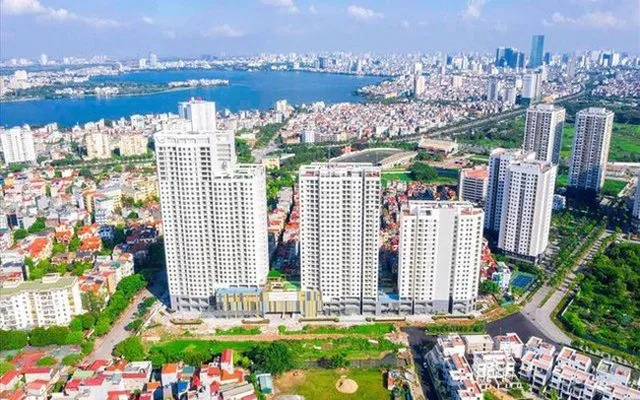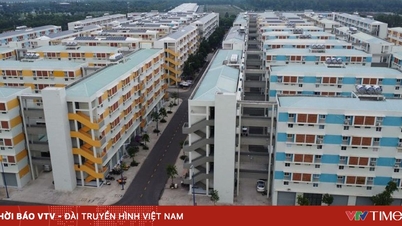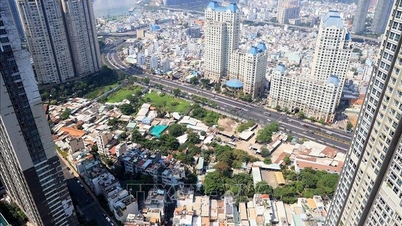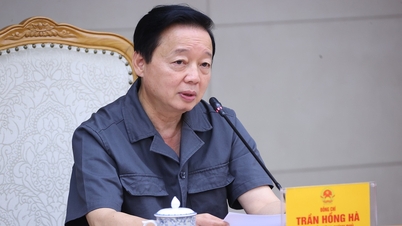
Illustration photo.
Faced with this situation, at the recent Central Steering Committee Conference on housing policy and real estate market, Prime Minister Pham Minh Chinh raised a question that "unties" the entire industry: "We must answer the question of why apartment prices are high and remain high?" That question not only reflects concerns about the rationality of the market, but also shows the urgent need to adjust policies, mechanisms and thinking on housing development, especially the social housing segment - which is considered the key to reducing apartment prices on a large scale.
* Real demand - imbalanced supply
Dr. Bui Duc Hung - Former Director of the Department of Financial Planning ( Ministry of Construction ) commented that analyzing the current market situation shows that the supply-demand conflict is one of the core causes. While the commercial housing segment, especially the middle-high end, has an excess of products, social housing is seriously lacking. There are many reasons for pushing up the price of apartments, but the root cause that has lasted for many years is the lack of supply of affordable social housing segment for buyers.
Prime Minister Pham Minh Chinh pointed out that the real estate market is developing unbalanced, with most of the supply concentrated in the high-end segment, far from the real needs of society. Housing prices are pushed up too high, sometimes increasing dramatically, especially in the two big cities of Hanoi and Ho Chi Minh City. “So many people need houses but because the prices are too high, they cannot buy them. Houses that cost over 70 million or 100 million VND per square meter, who has the money to buy them?”, the Prime Minister emphasized.
A report by the Ministry of Construction shows that apartment prices in Hanoi and Ho Chi Minh City are currently maintained at an average of 70-80 million VND/m2, an increase of about 5.6% compared to the beginning of the year. Meanwhile, many social housing projects have not been implemented on schedule, only reaching about 59.6% of the plan set out in the Project to build 1 million social housing apartments by 2030. The 145,000 billion VND credit package to support the development of this segment has only disbursed more than 4,000 billion VND after two years of implementation...
From an expert's perspective, Dr. Bui Duc Hung said that one of the main reasons why apartment prices are difficult to reduce is that businesses have difficulty accessing investment capital. Monetary policy has not created favorable conditions for real estate developers to access bank credit, while long-term capital mobilization channels such as corporate bonds and the stock market have not yet developed.
In the context of short-term credit capital from banks accounting for a large proportion, increasing liquidity risks make banks cautious when lending. This makes it impossible for businesses to implement new projects or delays, leading to a shortage of actual supply and pushing up prices.
At the same time, the legal system, despite many adjustments, still has many overlaps, is unclear and causes difficulties in the implementation process. Lengthy administrative procedures, lack of synchronization between functional agencies and localities, along with limited management capacity at the grassroots level also slow down the process of investment in construction and bringing housing to the market.
In addition to legal and capital factors, the input costs of apartment projects are increasing. Land prices, site clearance costs, land use fees, taxes, fees and construction material prices are all increasing, while there is no strict control mechanism. These costs are ultimately included in the selling price, pushing the burden onto the buyer - Mr. Hung analyzed.
In fact, many businesses also reflect that the current land price list and land use fee calculation method are placing a heavy burden on project development costs. Meanwhile, land valuation and land use fee collection are inconsistent between localities, leading to a lack of transparency and increasing investment costs.
* Market restructuring
Faced with the above situation, Mr. Nguyen Anh Que - Chairman of G6 Group, Member of the Executive Committee of the Vietnam Real Estate Association, made a series of specific and feasible recommendations to cool down apartment prices in the period of 2025-2027. First, it is necessary to soon complete and issue a new land price list in a more reasonable direction, at the same time thoroughly remove legal procedures, creating conditions for businesses to implement projects more smoothly.
At the same time, for land auctioned by individuals, Mr. Que proposed that it is necessary to clearly stipulate a mechanism to limit transfers within 2 years, require high deposits, prove financial capacity, and at the same time force payment within 7 days after winning the auction, in order to eliminate speculation and hoarding of land waiting for price increases...
At the same time, it is necessary to control the primary sales profit of apartment projects, limiting it to not exceed 50%. Because according to Mr. Que, currently many projects have a profit margin 2-3 times higher, pushing the selling price more than double the actual cost. For example, a luxury apartment project in Hanoi in 2022 costs 40 million VND/m2 with a construction cost of about 25 million VND/m2, but by 2025 the price will increase to 90 million VND/m2 while the cost will only increase to about 35 million VND/m2.
In particular, it is necessary to strongly develop social housing in and around big cities, with synchronous planning and good infrastructure, to create a supply source suitable to real market demand.
Sharing the same view, Dr. Bui Duc Hung emphasized that it is necessary to change awareness and shift housing investment from buying and selling to mainly increasing investment in rental housing and hire-purchase. This must be considered a breakthrough in implementing social housing policy.
This not only solves the housing problem but is also a solution to regulate social labor. Workers can go to any workplace, when they have a place to live that is suitable for their income; especially when restructuring the organization, implementing two-level local government, merging provinces, abolishing the district level, and merging communes.
“The ideology of the 2013 Constitution, the Party Resolutions and the Socio-Economic Development Strategy 2021-2030 clearly state: “The State, the community and the people have the responsibility to take care of housing development”. In particular, the State must play a leading role in taking care of social housing development. Therefore, it is necessary to review the model of enterprises with public service activities in the construction and business of social housing” – Dr. Bui Hung “suggested”.
In terms of the market, Mr. Tran Khanh Quang - General Director of Viet An Hoa Real Estate Company said that the current market does not lack products but lacks suitable products. Most of the current home buyers are not for living, but for investment or speculation, expecting to make a profit. Meanwhile, those with real needs cannot access them due to high prices.
Some current land management and urban development policies, although aimed at controlling the market, unintentionally hinder supply. For example, regulations on tightening land subdivision and sale, or the "self-negotiated compensation" mechanism make it almost impossible to implement small-scale projects, significantly reducing the flexibility and decentralization of the market.
Therefore, according to Mr. Quang, to reduce apartment prices, not only solutions regarding capital and administrative procedures are needed, but also deeper reforms in planning, land, financial management and orientation for sustainable housing development are needed.
Prime Minister Pham Minh Chinh has repeatedly emphasized the strategic role of social housing in socio-economic development policies, not only serving social security but also contributing to macroeconomic stability.
Thus, social housing is identified as a lever for the market. To reduce apartment prices, it is necessary to consider the development of social housing as a national investment priority with specific mechanisms on capital, land, tax and planning. At the same time, it is necessary to encourage private enterprises to strongly participate in this segment, through specific and feasible incentive policies.
Experts generally agree that the solution to the problem of reducing apartment prices cannot be achieved by a few single or short-term measures. This is an issue related to many fields, from urban planning, law, finance, tax, to housing development thinking and macroeconomic management strategy.
In particular, there needs to be close coordination between ministries, branches, localities and the business community. More importantly, we need to change the mindset of housing development to serve the people, not just as an investment tool. When the real estate market returns to its true value, with suitable products, reasonable and transparent prices, people will have more opportunities to access housing, and the economy will benefit from a stable, healthy and sustainable market.
Source: https://vtv.vn/go-nut-that-gia-nha-phat-trien-nha-o-xa-hoi-phai-la-uu-tien-chien-luoc-100250924195403496.htm






![[Photo] Prime Minister Pham Minh Chinh attends the groundbreaking ceremony of two key projects in Hai Phong city](https://vphoto.vietnam.vn/thumb/1200x675/vietnam/resource/IMAGE/2025/9/27/6adba56d5d94403093a074ac6496ec9d)




































































































Comment (0)